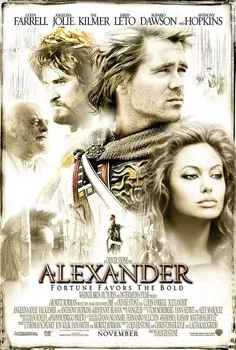Historical accuracy of Alexander

Historical accuracy of Alexander

Characters
Alexander the Great
While Alexander's ambition and military genius are historical, the film's portrayal leans towards romanticism. The complexities of his personality and motivations are simplified, and some historical events are condensed or altered.
Olympias
Olympias's political influence and ambition are grounded in history. However, the film's portrayal of her as a ruthless manipulator may be exaggerated for dramatic effect.
Philip II
He was a brilliant military strategist and laid the foundation for Alexander's conquests. The film depicts Philip as a strong and ambitious ruler, whose death is shrouded in intrigue.
Hephaestion
Hephaestion's close relationship with Alexander is factual, but the film's depiction of its nature is open to interpretation. Historians debate the extent of their intimacy, and the film presents a particular viewpoint.
Roxane
Roxane's marriage to Alexander is historically accurate. However, the film's portrayal of her influence and personality is largely speculative, as historical records provide limited details.
Darius III
Darius III was the last king of the Achaemenid Empire before Alexander's conquest. The film's depiction of his battles and defeat is consistent with the major historical events.
More characters
Ptolemy I
Ptolemy was a real general who served under Alexander, and he did write a history of Alexander. The movie uses him as a narrator, but his narration is used to give a particular slant on events, and so while based on a historical figure, it is only partly accurate.
Story
Alexander tames the horse Bucephalus
Plutarch and other ancient writers recount this story. While potentially embellished, the core event is generally accepted.
Olympias' snake obsession
Ancient sources, though potentially biased, describe Olympias' association with snakes and Dionysian rituals. The film dramatizes this, but the core idea has some basis.
Philip's assassination by Pausanias
Philip II was indeed assassinated by his bodyguard Pausanias. The film simplifies the complex political motivations, but the core event is accurate.
Hephaestion's close relationship with Alexander
Historical accounts confirm Hephaestion was Alexander's close friend and general, holding a high position and influence.
Aristotle as Alexander's tutor
Aristotle was indeed Alexander's tutor during his youth.
Alexander's bisexuality
Ancient sources mention relationships with both men and women, but the modern concept of 'bisexuality' doesn't neatly map onto ancient understandings of sexuality.
Roxane's fiery personality
Sources suggest Roxane was strong-willed and independent, though the film might exaggerate these traits for narrative purposes.
Ptolemy's narration as an objective truth
Ptolemy's memoirs, the film's framing device, are known for bias and self-promotion. Presenting his account as objective is misleading.
The Battle of Gaugamela
The film depicts the battle's scale and key tactics (like the Companion cavalry charge), but compresses events and simplifies the Persian response.
Alexander's siege of Tyre
The siege lasted seven months and involved complex engineering feats. The film does not include this event.
Alexander's burning of Persepolis
Ancient sources disagree on whether the burning was deliberate or accidental. The film mentions it as a drunken act of revenge, which is one interpretation but not universally accepted.
Alexander's Indian campaign
The film shows Alexander reaching India and fighting Porus, but condenses the long campaign and omits key battles and challenges.
Alexander's death by poisoning
While poisoning theories exist, most historians attribute Alexander's death to illness.
Setting
The film's portrayal of the Macedonians
The film captures the rough, warrior culture of the Macedonians and their complex relationship with the more 'civilized' Greeks.
The film's portrayal of the Persians
While visually impressive, the film's portrayal of the Persians is somewhat stereotypical and doesn't fully capture their cultural and military sophistication.
